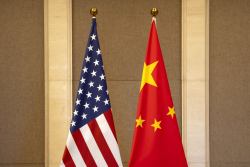his presidency and how it may have evolved since then. During his time in office, Trump took a hardline approach towards China, imposing tariffs on Chinese goods, accusing China of unfair trade practices, and engaging in a trade war with the country. He also criticized China’s human rights record and accused the country of intellectual property theft. However, it is important to note that Trump’s approach towards China was not always consistent, and he often vacillated between confrontation and negotiation.
In the final two years of his presidency, Trump’s China policy may have evolved in response to changing circumstances. The COVID-19 pandemic, which originated in China, highlighted the importance of global cooperation and may have led Trump to consider a more pragmatic approach towards China. Additionally, the escalating tensions between the two countries may have necessitated a reevaluation of his policies. It is possible that Trump may have sought to de-escalate tensions with China in order to focus on other domestic and international priorities.
If Trump were to return to the White House in 2025, his China policy may be influenced by a number of factors. The state of the U.S. economy, the geopolitical landscape, and the actions of the Chinese government will all play a role in shaping Trump’s approach towards China. It is possible that Trump may continue to take a tough stance towards China, especially if he believes that the country poses a threat to U.S. interests. However, he may also seek to engage in negotiations with China in order to address issues such as trade imbalances and intellectual property theft.
Overall, Trump’s China policy in 2025 is likely to be a continuation of his previous approach, with some modifications based on changing circumstances. It is difficult to predict with certainty how Trump would handle China if he were to return to the White House, but it is clear that the relationship between the two countries will continue to be a key issue in U.S. foreign policy. Ultimately, Trump’s China policy will be shaped by a complex interplay of domestic and international factors, and it will be important for policymakers to carefully consider the implications of his approach towards one of the United States’ most important strategic competitors.









